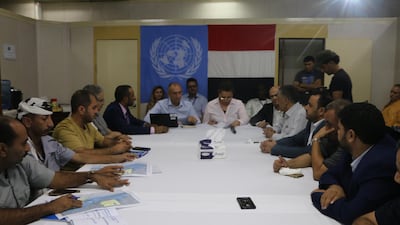Yemen’s peace process advanced incrementally this week after new ceasefire measures were agreed between the warring parties, but mistrust remains high.
Yemen's internationally recognised government and Houthi rebels agreed to a peace deal in Sweden last December that stipulated the withdrawal of forces from the crucial port in Hodeidah, the formation of a joint committee to address the besieged city of Taez, and an exchange of prisoners.
On Monday, representatives from both sides said they are keen to reduce hostilities following two days of talks aboard a UN ship during which ceasefire violations in Hodeidah were discussed.
A UN committee was set up to oversee the ceasefire and the withdrawal of troops from the port city to monitored the progress of the deal. Danish Lt Gen Michael Lollesgaard leads the UN observer team in Hodeidah.
Why has the peace deal on Hodeidah stalled?
The withdrawal was supposed to have taken place two weeks after the truce went into force on December 18 but the deadline was missed.
In May, the UN announced the rebels had withdrawn from Hodeidah and two nearby ports, the first practical step since the ceasefire deal.
But the government accused the Houthis of faking the withdrawal, saying it had merely handed control to local allies.
The recent meeting is the first time the redeployment committee has met since February and indicates progress, Elizabeth Dickinson, a senior analyst for the Arabian Peninsula at the International Crisis Group told The National.
“What's also clear, however, are the limits to these technical talks. The key stumbling block – the composition of 'local security forces' that will take over once military elements redeploy – will require political conversations to resolve,” Ms Dickinson said.
There does seem to be a renewed vigour for the political process, Elana DeLozier, a research fellow at the Washington Institute for Near East Policy, told The National.
“Overcoming trust issues remains a challenge, as evidenced by the parties continuing to meet on a boat in the Red Sea for the Hodeidah talks because they cannot agree on a neutral location on land,” Ms DeLozier said.
If the parties did reach an agreement over who constitutes "local forces" in Hodeidah, that would represent significant progress.
What has happened to the peace process since Stockholm?
The Stockholm agreement can still provide an opening that leads to broader political talks in Yemen, Ms Dickinson said.
"The goal now is to make sure implementation continues to move forward, while the ground can be laid for a pivot to more comprehensive discussions,” she said.
On Monday, the UN special envoy to Yemen Martin Griffiths meet with Yemen’s President Abdrabu Mansur Hadi. Earlier the president had accused the envoy of showing partiality towards the rebels but Mr Griffiths remained outwardly positive following the meeting.
"I just concluded a meeting with President Hadi. I am grateful to him and his Government s commitment to the Stockholm agreement and his personal support to finding a political solution to the conflict in Yemen," Mr Griffiths said on Twitter.
In May, President Hadi took issue with Mr Griffiths over the rebel withdrawal from Hodeidah, writing a letter to UN chief Antonio Guterres saying he "can no longer accept these offences" by the UN envoy.
But the UAE, Saudi Arabia, and US have put their full support behind Mr Griffiths in recent weeks, which might have put pressure on President Hadi to try to patch things up with Mr Griffiths, Ms DeLozier said.
“If the special envoy can get a win in Hodeidah, the hope is that he can use that to pivot to a broader set of talks on a comprehensive political solution between the parties outside of just Hodeidah,” she said.
The UN is hoping that a de-escalation in Hodeidah will allow desperately-needed food and medical aid to reach millions in need in Yemen.
The conflict in Yemen began with the 2014 takeover of the capital Sanaa by Iran-backed Houthi rebels, who forced out the government.
Saudi Arabia is leading an Arab Coalition that includes the UAE and intervened in Yemen in 2015 to try to restore the government.


